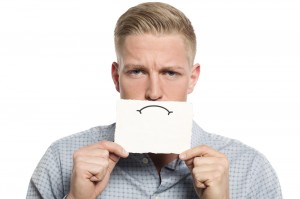
Breathe. Hold in your mind your view of what constitutes the most effective psychological therapy for acute depression. Try not to identify with your favourite therapy but simply observe it and let it be. Wish it well. And breathe again.
This was not the approach of the Cochrane Depression, Anxiety and Neurosis Group when it turned its attention to third wave cognitive and behavioural therapies (CBT) in a recent systematic review (Hunot et al, 2013).
One of the most ancient of techniques for dealing with suffering has become the most modern of psychological approaches for treating acute depression. Third wave cognitive and behavioural therapy refers to a family of treatment approaches to depression that all share the core aim of helping people to become aware of their thoughts and treat them in a non-judgemental way. These therapies differ from traditional CBT techniques in that their focus is on the process of thought, rather than engaging with its content. In many treatment contexts such techniques have displaced or complement traditional CBT approaches.
But is this enthusiasm for these new mindfulness based techniques warranted? Are these techniques as effective in reducing depressive symptoms – or better – than the techniques they are displacing? Are their effects as long lasting? And are people as willing to be given these sorts of treatment as they are to receive CBT?

Third wave cognitive and behavioural therapies aim to help people become aware of their thoughts and treat them in a non-judgemental way
Methods
Those hard-nosed Cochrane reviewers set about answering these questions by examining randomised controlled trials, of suitable quality, from Medline, EMBASE, PsycINFO and other databases which compared third-wave therapies to other psychological therapies, using two review authors to independently identify studies, assess trial quality and extract data.
Results
- Three studies of acceptable quality were identified by the reviewers
- Two studies (56 participants in total) compared an early version of Acceptance and Commitment Therapy (ACT) with CBT
- Both ACT studies were assessed as being high risk for bias due to researcher allegiance, as the first author’s named supervisor in both was Dr Steven Hayes who developed ACT
- The third study (88 participants) compared extended behavioural activation with CBT
- Response rates for all three studies combined, using BDI or HAM-D scores, showed no difference in outcome for the third wave therapies compared with CBT (1.14, 95% CI 0.79-1.64). However, this evidence was deemed ‘very low quality’
- There was also no difference in terms of acceptability of both treatments to the participants with similar drop-out rates for both groups of treatments (RR 1.12, 95% CI 0.47 to 2.67)
- The two ACT studies also performed follow up measurements of clinical response at two months post-treatment which showed no significant difference between the ACT group and the CBT group (RR 0.22, 95% CI 0.04 to 1.15), though this finding was also deemed of ‘very low quality’

The review only included 3 studies, which were described as ‘very low quality evidence’
Conclusion
The authors preface their conclusions in this review with several remarks:
- They note the small number of trials identified, and offer the possibility that some of the studies conducted recently may have been unpublished or sit in the grey literature (unindexed reports)
- All three studies were conducted in North America and two were conducted before 1990, and are therefore of uncertain applicability to contemporary non-US settings
- Most forms of third wave therapy were not included in the trials examined, including:
- Mindfulness based cognitive therapy (although this may be used more widely in relapse prevention than in acute depression)
- Meta-cognitive therapy
- Compassionate mind training
- Functional analytic psychotherapy
- Many primary and secondary outcome measures that would be of interest – including measures of quality of life, adverse events or economic outcomes – were not included in analyses
- There were no follow up measures taken in one study and the other two were limited to two months, thus making a judgement about the long term durability of the treatments difficult
The authors conclude that ‘very low quality evidence’ suggests that third wave CBT and other psychological approaches are equally effective and acceptable in the treatment of acute depression.
Given the rise of third wave therapies and their spread across UK mental health treatment services it is of integral importance to conduct further studies to determine whether these therapies really are better than CBT. Currently clinical guidelines recommend the use of mindfulness-based CBT (MBCT) as a relapse prevention intervention in those patients with a history of three or more episodes of depression, but there is growing interest in the use of MBCT for acute depression. Two registered trials comparing third wave therapies to other psychological therapies in major depressive disorder are therefore of considerable interest (NCT01070134), (NCT01517503).
The reviewers suggest that future studies should focus on:
- Allocation concealment and blinding of outcome assessors
- Treatment fidelity
- Therapist qualification and experience
- Researcher and therapist allegiance
- The inclusion of acceptability outcomes, adverse events, quality of life and cost-effectiveness should also be include
- There should be longer term follow up to establish the comparative durability of third wave CBT approaches to other psychological treatments

The review identified at least two ongoing trials that may soon add to the evidence-base in this field
Discussion
It is interesting to note how clinical enthusiasm can run ahead of the evidence base. While these newer therapies are intuitively appealing and anecdotal evidence of their success abounds, it is important that we do not let our desire to help people suffering with acute depression displace our dedication to providing care with a rigorous evidence base.
While signs do point to the efficacy of these new treatments, the field would be well served by studies that compare gold standard psychological treatments for depression against mature versions of third wave therapies. When clinical intuition is backed up by firm evidence we will know we are indeed heading in the right direction.

Happy and enthusiastic health professionals need to be sure that their clinical intuition is backed up by high quality research
Links
Hunot V, Moore THM, Caldwell DM, Furukawa TA, Davies P, Jones H, Honyashiki M, Chen P, Lewis G, Churchill R. ‘Third wave’ cognitive and behavioural therapies versus other psychological therapies for depression. Cochrane Database of Systematic Reviews 2013, Issue 10. Art. No.: CD008704. DOI: 10.1002/14651858.CD008704.pub2.

Be Mindful of the Gap: What we know about ‘third wave’ cognitive behavioural therapies compared to other psych… http://t.co/0AQDpcytOS
.@mental_elf misleading title, only for depression – 3rd wave vs other therapies for other problems: e.g. ACT http://t.co/Kd22dIhrxq
“@Mental_Elf: Be Mindful of the Gap: What we know about ‘third wave’ CBTs. Thanks. This message is important, much more evaluation needed.
Cochrane review: ‘Third wave’ cognitive & behavioural therapies versus other psychological therapies for depression http://t.co/JtKyL0DvRw
@Mental_Elf err… *what are* these so-called “gold standard psychological treatments for depression”?
@_Lucibee @Mental_Elf the authors refer to psychodynamic, behavioural, humanistic, integrative and cognitive-behavioural approaches
@_Lucibee @Mental_Elf perhaps ‘gold’ was a bit purple – but standard, widely accepted evidence-based therapies
@markhoro @Mental_Elf Well I just wish I had access to them! :)
RT @Mental_Elf: Cochrane review: ‘3rd wave’ cognitive&behavioural vs other psychological therapies for depression http://t.co/rgxdo0j1j1
Please leave mindfulness out of this. ACT proponents have hijacked mindfulness for their own ends and I don’t like it! :)
How can psychological therapies that target the process of thoughts help adults with acute depression? http://t.co/JtKyL0DvRw
@mental_elf undo -ve conditioning (positively affecting mood, behaviour & health) UNLESS -ve conditioning is reinforced/remains via effects
@mental_elf I’ve JUST read chapter2 of a #CBT book: “Its the thought that counts” which… ah, never mind, I’ve got volunteering apps to do!
@Mental_Elf Hello, my name is Jo, and I am doing a blog about depression in children! I would love your support, thank you! X
Nice blog by @markhoro on @Mental_Elf about ‘third wave’ CBT compared to other psychological therapies. http://t.co/wS81KPjHoU
@profelainefox @Mental_Elf thanks – I actually just read your book. Right back at you – good book.
@markhoro @Mental_Elf Many thanks!!
@markhoro @Mental_Elf @profelainefox supervising thesis looking at Third wave approaches for auditory hallucinations important review
#Mindfulness as effective as #CBT in helping with #depression. http://t.co/KXgEwj8py4
@cochranecollab compare acceptance and commitment therapy (ACT) to CBT for adults with acute depression http://t.co/JtKyL0DvRw
@cochranecollab calls for further trials of third wave CBT approaches in clinical practice http://t.co/JtKyL0DvRw
“clinical enthusiasm can run ahead of the evidence base” via @Mental_Elf: http://t.co/ER7qnzlHXm
Don’t miss: Be Mindful of the Gap – what we know about ‘third wave’ CBTs compared to other psychological therapies http://t.co/JtKyL0DvRw
@Mental_Elf pure cbt does not sustain results, combined with psychotherapy the client resolves as well as maintains.
Be Mindful of the Gap ‘third wave’ cognitive behavioural therapies compared to other psychological therapies http://t.co/fkFaKwGk5v
Mental Elf: Be Mindful of the Gap: What we know about ‘third wave’ cognitive behavioural therapies compared to… http://t.co/kvYuoWxhyO
Excellent @Mental_Elf piece on mindfulness-related CBT for depression. Again, how to evaluate research. #clinpsych http://t.co/TRU09RvY6v
“@Mental_Elf: Be Mindful of the Gap – what we know about ‘third wave’ CBTs http://t.co/RT64OWeeZa“
[…] or problem solving and emotional regulation techniques to manage stress. For more information on Third wave CBT please see further info in another mental elf blog by fellow elf Mark […]
[…] The CBT intervention was deemed to be “third-wave”; […]